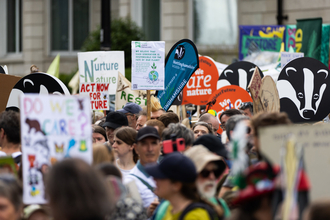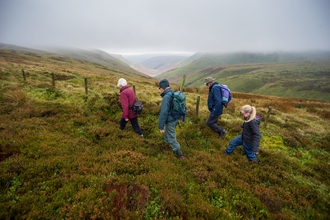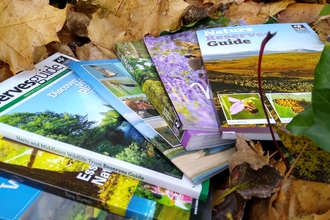- The world around us shapes everyone’s health and wellbeing. This is especially true of the natural world.
-
The condition our neighbourhoods are in directly affects how long people will live, and the quality of their lives. Issues like air quality, the impacts of climate change and how much nature we can enjoy on our doorsteps all impact on our health.
- Right now in the UK, poor quality living conditions are damaging people’s mental and physical health and wellbeing and actually cutting lives short. While we know that for some people, this is caused by long-term medical conditions and life-limiting disabilities, Wildlife Trusts are committed to bringing about a wilder future – where healthy people live alongside a healthy natural environment.
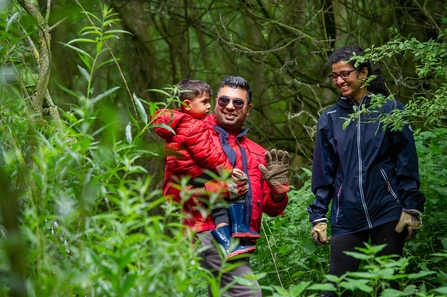
The current situation is unfair
Too many of us live in polluted, nature-deprived neighbourhoods, at a great cost. This is unacceptable – but it is also avoidable:
-
One third of us do not have nature-friendly places near home. That’s nearly 9.5million households in England.
-
6.7 million children live in areas of the UK where the air is unsafe to breathe – beyond legal limits – which is leading to 36,000 child deaths every year in the UK.
-
People from black and ethnic minority groups are twice as likely to live in a nature-poor neighbourhoods.
-
Access to safe natural spaces for play is unequal: with children in affluent areas being 9 times more likely to have green places.
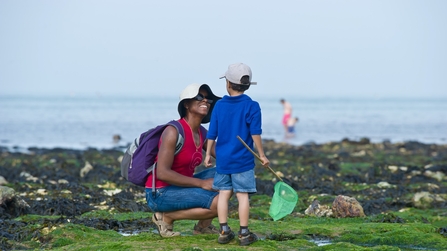
When everyone benefits from nature on their doorsteps – when we can see trees, enjoy bursts of colour and listen to birdsong; when we can easily travel to and access wildlife-rich places like a beach, riverside or a park - whether in person, or via an app or a webcam (Link to Wildlife Trusts webcams) for those not able to get out - then everyone’s health and wellbeing will improve.
Having easy access to healthy natural places has been proven to increase physical activity, social connections and mental health.
Many of us instinctively feel that nature is good for us, but there is plenty of evidence to support these positive impacts – which in turn will help relieve the burden on overstretched health services.
What can I do to get involved?
-
Call for a new law that will give everyone ‘a right to access nature’ Nature for Everyone
-
Act for your own health and wellbeing. See how Nextdoor Nature from The Wildlife Trusts is enabling communities like yours across the country, and find out how you can get involved
References
* Evidence review: benefits of nature for physical and mental health (The National Academy of Social Prescribing Academic Partnership, December 2022)
Links to specific studies:
[1] Links between natural environments and mental health – EIN065 (nepubprod.appspot.com)
[3] Links between natural environments and physical health – EIN066 (nepubprod.appspot.com)
[4] How the Natural Environment can support Children and Young People (EIN067)
[5] Connection to Nature (EIN068)
FAQs
Who are Health Equals?
Health Equals is a coalition of 29 organisations, brought together by their commitment to ensure that everyone in the UK has equal access to the building blocks for good health, regardless of who they are or where they live. They are a group of organisations and voices across different sectors, including the Wildlife Trusts, spanning employment, housing, business and the environment, who all want to make a positive difference to society’s health and wellbeing.
Why are Wildlife Trusts involved?
Wildlife Trusts work contribute to the building blocks of good health – things like access to nearby nature, clean air and water, affordable food, high quality houses and sustainable jobs. As well as benefiting people, more nature makes economic sense. Creating greener and wilder places can help reduce the burden on our health service because many health conditions can be improved through nature.
Why do we care about health inequalities?
Wildlife Trusts are rooted in their local communities. Our work and our places have a wide-range of impacts, including a proven, positive impact on health and wellbeing at individual, community and ecosystem levels. Goal 3 of our collective strategic vision towards 2030 is that nature has an ever-increasing valued role in helping to address local and global problems. This includes a specific ambition that nature will be “playing a more significant role in keeping people healthy and reducing health inequality, with at least 30% more people will be participating regularly in outdoor activity in high quality accessible natural green and blue spaces near where they live”.


